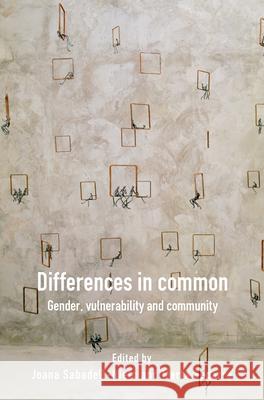Differences in Common: Gender, Vulnerability and Community » książka
Differences in Common: Gender, Vulnerability and Community
ISBN-13: 9789042038356 / Angielski / Miękka / 2014 / 252 str.
"Differences in Common" engages in the ongoing debate on 'community' focusing on its philosophical and political aspects through a gendered perspective. It explores the subversive and enriching potential of the concept of community, as seen from the perspective of heterogeneity and distance, and not from homogeneity and fused adhesions. This theoretical reflection is, in most of the essays included here, based on the analysis of literary and filmic texts, which, due to their irreducible singularity, teach us to think without being tied, or needing to resort, to commonplaces. Philosophers such as Arendt, Blanchot, Foucault, Agamben or Derrida have made seminal reflections on community, often inspired by contemporary historical events and sometimes questioning the term itself. More recently, thinkers like Judith Butler, Gayatri Spivak or Rada Ivekovi -included in this volume are essays by all three-have emphasized the gender bias in the debate, also problematizing the notion of community. Most of the essays gathered in "Differences in Common" conceive community not as the affirmation of several properties which would unite us to other similar individuals, but as the "expropriation" of ourselves (Esposito), in an "intimate diaspora." Community does not fill the gap between subjects but places itself in this gap or void. This conception stresses the subject's vulnerability, a topic which is also central to this volume. The body of community is thus opened by a "wound" (Cixous) which exposes us to the "contagion" of otherness. The essays collected here reflect on different topics related to these issues, such as: gender and nation; nationalism, internationalism, transnationalism; nationalism's naturalization of citizenship and the exclusion of women from citizenship; the violent consequences of a gendered nation on women's bodies; gendering community; preservation of difference(s) within the community; bodily vulnerability and new politics; community and mourning; community and the politics of memory; fiction, historical "truth" and (fake) documentary; love, relationality and community; interpretive communities and virtual communities on the Web, among others.











